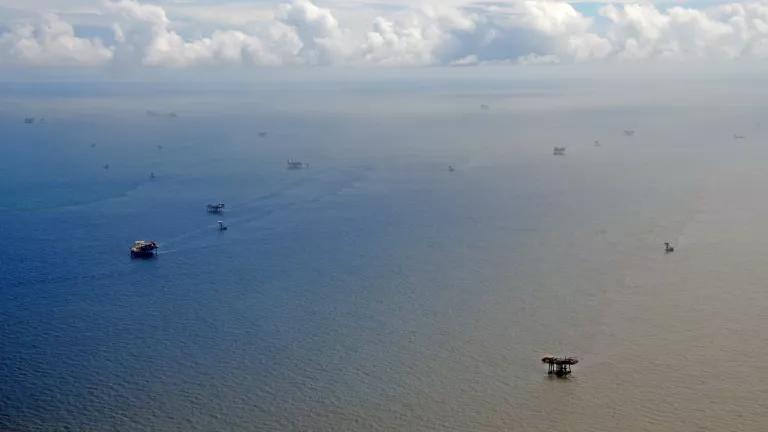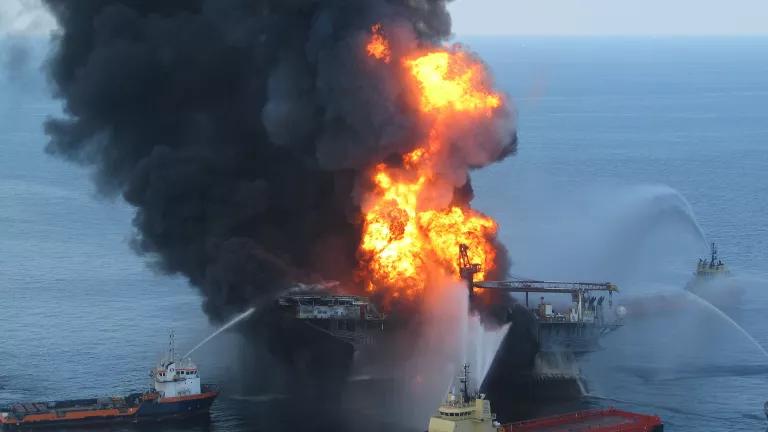Science, Industry, NGOs Brief Congress on Right Whale Crisis

If we are going to save the North Atlantic right whale, we must act now.
That was the resounding message from scientists, the fishing industry, and environmental groups at a briefing on Capitol Hill yesterday. Staffers were provided with three main take-homes:
- Support the request to the Senate Appropriations Committee for an additional $5 million in FY19 funding for right whale-related research and development to reduce entanglement in fishing gear.
- Support The SAVE Right Whales Act of 2018 that will provide sustained federal funds for conservation programs targeted at the main drivers of North Atlantic right whale mortality and serious injury: entanglement in fishing gear and vessel collisions.
- Support House and Senate requests that the National Oceanic and Atmospheric Administration urgently assess whether Canadian fisheries meet comparable marine mammal conservation standards as those in the United States, as required by the Marine Mammal Protection Act.
The briefing was organized by the IFAW - International Fund for Animal Welfare and co-sponsored by the Natural Resources Defense Council and Woods Hole Oceanographic Institution. Representatives Raúl M. Grijalva (D-AZ), Seth Moulton (D-MA), and Jared Huffman (D-CA), and Senators Edward Markey (D-MA), Cory Booker (D-NJ), Tom Carper (D-DE), and Bill Nelson (D-FL) co-hosted the event.
Renowned scientist and veterinarian, Dr. Michael Moore, based at the Woods Hole Oceanographic Institution, relayed the latest science on the decline of the North Atlantic right whale and described in detail the horrific injuries that he’s witnessed resulting from entanglement in fishing gear. I felt the entire room grimace at those images.
Next, Beth Casoni, Executive Director of the Massachusetts Lobstermen’s Association explained the fishing industry’s perspective on saving the North Atlantic right whale, and the economic and logistical challenges that will need to be overcome in transitioning to ropeless fishing gear (or “buoy-less” fishing gear, as the industry prefer to describe it).
The Massachusetts Lobstermen’s Association will be one of the first industry groups to collaborate with IFAW on a pilot project to test buoy-less fishing technology this summer.
Then it was my turn to take the podium. My remarks emphasized how special the North Atlantic right whale is to every single state along the eastern seaboard. Yes, the conservation situation is dire, but we also have much to celebrate in terms of the direct and targeted action being taken by Congress to protect the North Atlantic right whale for generations to come.

I took a moment to underline how essential it is to translate this buzz of political will into real, on-the-ground action. The tragic story of the vaquita, our planet’s smallest porpoise that will be extinct in the next year or two due to entanglement in gillnet fishing gear, is a devastating example of what can happen when even significant action comes too late.
C.T. Harry, who worked for many years as the Assistant Stranding Coordinator for IFAW’s Marine Mammal Rescue & Research Program, now campaigns on U.S. marine policy issues in Washington D.C. Harry described how he himself responded to many stranded whales that had died as a result of entanglement in fishing gear and vessel collision. After bearing witness to increasing numbers of right whale deaths, as well as those of other species, Harry transitioned to campaign work to help develop and advance policies to protect these magnificent animals.
There are solutions, our panel enthused, but to save the North Atlantic right whale we need to act with immediacy and with true intent to address the major drivers of extinction head-on.
You can help take action by calling on your representatives to support the current actions being taken by Congress. If your representative is already leading on this issue, you could show your appreciation by sending a quick note of thanks.
You can find your Congressional representative’s contact information here.




